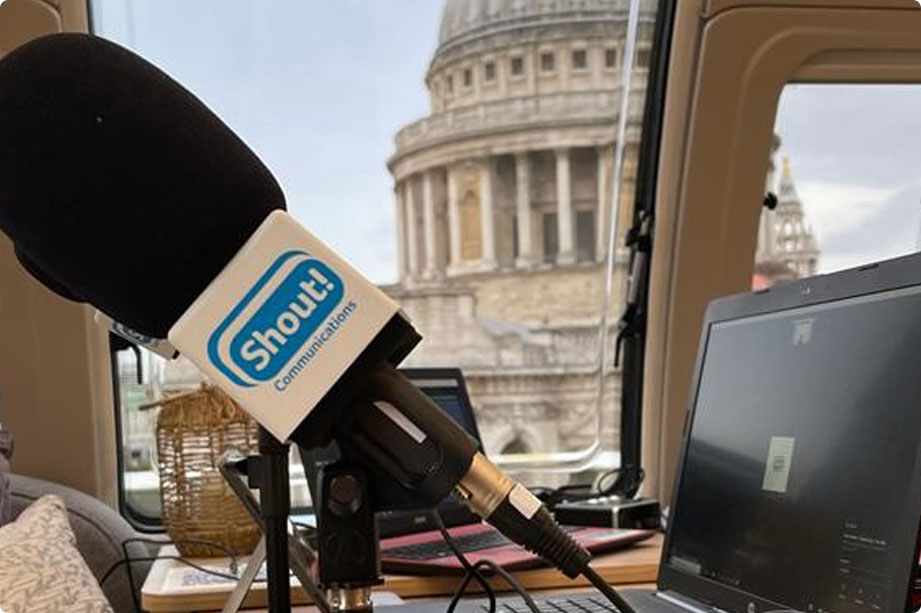Our media training is tailored to individuals and small groups. We offer any combination of TV, radio, print and/or social media. You can commission us for a full, half or three quarter day session. A shorter, two hour, advanced refresher is also available.
HOW WE CAN HELP
Our recommendation is to have no more than 3-4 people in a session, especially for those with little or no experience. That’s because our training is largely practical and the more interviews, followed by feedback, delegates have, the more each will improve.
A thorough briefing before we design the training is key to the success of the session, allowing us to tailor make a programme for those taking part. Below are examples of what a half or full day media training could look like.

Half day: Radio and TV
| 09.00 | WELCOME AND INTRODUCTION Outline of course, timetable for day, review of participants’ needs |
| 09.05 | HOW THE MEDIA WORKS AND HANDLING INTERVIEWS What journalists want. Tricks and traps. Advice on the techniques of working key messages into answers and how to handle hard and persistent questioning. |
| 09:30 | PRACTICAL SESSION 1: RADIO |
| 10.15 | TV THEORY Preparation, presentation, performance. Body language, what to wear. Types of interviews. Logistics |
| 10.30 | PRACTICAL SESSION 2: TV One to one pre-recorded TV interview, pro-active opportunity. Objective to record a sound bite. Each trainee takes centre stage for an interview, followed by feedback on how they’ve performed. Feedback and analysis. |
| 11.15 | COFFEE BREAK |
| 11.30 | PRACTICAL SESSION 3: TV “Live” television interview. Handling difficult/hostile questions. Reactive opportunities. Feedback and analysis |
| 12.15 | PRACTICAL SESSION 4: Television “Down the line” interview (the interviewee is in a different location to the interviewer, so looks direct to camera) OR spend more time on print techniques/social media support. |
| 12.55-13.00 | SUMMING UP AND REVIEW |
Full day: Radio, TV and print – with an option to bring in a second trainer for print
| 09.00 | WELCOME AND INTRODUCTION |
| 09.05 | RADIO THEORY SESSION: HOW THE MEDIA WORKS AND HANDLING RADIO INTERVIEWS What journalists want. Requirements for radio interviews. Preparing for a radio interview. Differences between commercial and BBC, national and regional. Journalistic tricks and traps. Techniques for working key messages into answers. Handling difficult and persistent questioning |
| 09.30 | PRACTICAL SESSION 1 RADIO Perfect Spokesperson – Perfect Soundbite. One to one pre-recorded interview. Each trainee takes centre stage for an interview, followed by feedback on how they’ve performed. Feedback will include initial thoughts on voice intonation and tone. |
| 10.15 | PRACTICAL SESSION 2 RADIO Live studio-style interview – followed by analysis. |
| 11.00 | Break |
| 11.15 | PRINT THEORY “On/off” the record. Print pitfalls. Telephone vs face-to-face interviews. |
| 11.30 | PRACTICAL SESSION 3: PRINT Telephone interview for print. (If you had a second trainer then we could run two practical sessions simultaneously – 3 people doing radio whilst 3 people do print, then they’d swop).* |
| 12.30 | THEORY: SOCIAL MEDIA Supporting your PR opportunities with Twitter, Instagram, LinkedIn and Facebook. |
| 13.00 | Lunch |
| 13.45 | TV THEORY Preparation, presentation, performance. Body language, what to wear. Types of interviews. Logistics. |
| 14.15 | PRACTICAL SESSION 4: TV The Perfect TV soundbite. Each delegate is interviewed with the goal of providing a single soundbite. Followed by playback & analysis. |
| 15.00 | PRACTICAL SESSION 5: TV Live studio/sofa style interviews. Followed by feedback and analysis |
| 15.45 | Break |
| 16.00 | PRACTICAL INTERVIEW 6: TV |
| 16.45 | PRACTICAL INTERVIEW 7: TV On location interviews eg at a conference, in the street |
| 17.30 | Summing up. Review of objectives. END |
*If you had a second trainer for print they would write their interviews up whilst the delegates did their television training. If you have just one trainer they would provide a written quote taken from the print interview the next day.
Get in Touch
